“Coworker Kept Stealing My Lunch, So I Started Leaving Fake Leftovers To Teach Them A Lesson”
Many people bring lunch to work – it’s cheaper than going out, healthier than munching on what office-adjacent fast food restaurants have to offer, and a good way not to let yesterday’s leftovers go to waste.
But some of the lunch-bearing employees often face an aggravating issue – coworkers stealing their food. This redditor was no exception. After bearing with it for months, though, they had enough and decided to seek petty revenge, which seemed to have made the thief change their ways.
We wanted to learn more about how food thieves can affect the employees in a company, so we got in touch with a professor of psychology at New York University, Dr. Tessa West, and an associate professor at the USC Price School of Public Policy, Dr. Peter J. Robertson, who were kind enough to answer a few of Bored Panda’s questions on the topic. Scroll down to find their thoughts in the text below.
It’s safe to assume that many people count the minutes until lunchtime at work

Image credits: Karolina Grabowska / unsplash (not the actual photo)
Unfortunately, some people can’t find their meal come lunch break, because of a food thief in the office




Image credits: GraceBreezy21
Many people have had to deal with a food thief at work

Image credits: milodmitry / freepik (not the actual photo)
Anyone who works in a team of people knows that they can make or break the job itself. Even the most difficult of tasks often don’t seem that daunting with a good backup—the same way little undertakings can become extremely frustrating, working with a bunch of * insert whatever word you prefer here *.
Needless to say, individuals stealing food at work don’t really make a person love their coworkers—or the workplace itself—more. Unfortunately, it’s something many people have to deal with; in some cases, on a daily basis. According to Zippia, nearly half of employed individuals have experienced what it feels like to have their food disappear from the fridge at work. Roughly a third admitted having been in the shoes of the thief themselves.
“Having a reliable lunch situation seems like a small thing, but it’s not. Each day, you go into lunch with uncertainty, not knowing whether your food will be there or not. That on its own is stressful; having locus of control is important—uncertainty-based stress is the worst kind,” said Dr. Tessa West, a professor of psychology at New York University.
“Second off, food stealing violates a norm, and it breeds paranoia and mistrust,” she added. “Who is stealing this food? And importantly, who knows about it and isn’t stopping it? None of this is good for workplace morale. Or your blood sugar levels.”
The expert continued to note that there’s a lot of research showing that when procedural justice rules are violated—meaning that people aren’t all treated fairly, and some people get away with things that others don’t get away with—it creates a lot of cheating and cutting corners. “A blasé attitude about food theft might just be the canary in the coal mine for this workplace; people don’t treat each other with respect, or hold other people accountable for doing so either.”
“[Food theft] raises all sorts of issues regarding trust among co-workers, fairness, and justice in the workplace,” expert says

Image credits: Yan Krukau / pexels (not the actual photo)
An expert in organizational behavior, and an associate professor at the USC Price School of Public Policy, Dr. Peter J. Robertson noted that in such situations, the problem is way bigger than just loss of food. “It raises all sorts of issues regarding trust among co-workers, fairness, and justice in the workplace, and the level of managerial and organizational support,” he told Bored Panda. “If the problem is not resolved, it could easily undermine the employee’s motivation and commitment and possibly even workgroup morale and workplace climate.”
A recent survey carried out by Kickresume found that a life without an aggravating coworker is something few people have experienced. According to the survey, as much as 85% of employed individuals have had an experience with someone annoying at work. Just over six in ten shared having faced annoying behavior directly in the office. Unsurprisingly, nearly as many people believe that annoying coworkers significantly impact their productivity; and it’s safe to assume that they don’t impact it in a positive way.
When certain coworkers make other people’s lives needlessly difficult, it’s not uncommon for them—and might even be advisable—to address the issue with their superior. After all, managing people is usually part of their job description.
“Superiors need to help create norms in the workplace of treating each other with respect. That is their job,” Dr. West said, adding that they should make sure that the same way people don’t steal ideas and credit and petty cash, they shouldn’t steal food, either.
“We take food theft at work lightly, but I do think it’s a sign of character. Imagine, for a moment, that you went on a date with someone and found out that they were a chronic food stealer,” West suggested. “Would you go out with them again? Or you were interviewing someone for a job. Would you hire them? I wouldn’t. This is one of those small behaviors worth a thousand words.”
Dr. Robertson seconded the idea that it is imperative that the supervisors take an active interest in the problem, which should include taking steps to identify the perpetrator—if not known—and to punish them (when identified). “Failure to do so will likely contribute to negative attitudes about the supervisor and maybe even the organization as a whole,” he added.
Talking about the victim taking revenge on the food thief themselves, the expert noted that retribution of any kind is risky, given the potential for escalation that could lead to very serious outcomes, such as workplace violence, for example.
“In any case, messing with the food is a relatively passive-aggressive approach to addressing the problem, and likely to be less effective than a more direct, assertive confrontation that addresses the issue head-on,” Dr. Robertson said, pointing out why taking the same approach the OP did might not always work. Some redditors in the comments also suggested that it’s better not to mess with food at work, even if it’s yours.
People shared their reactions and similar stories in the comments
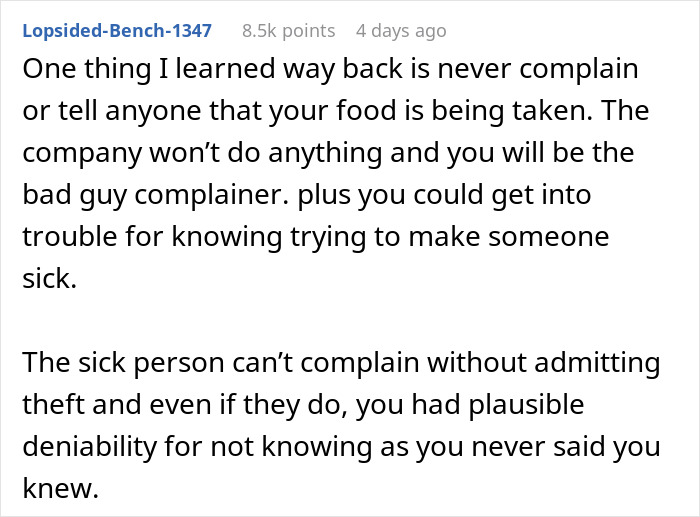
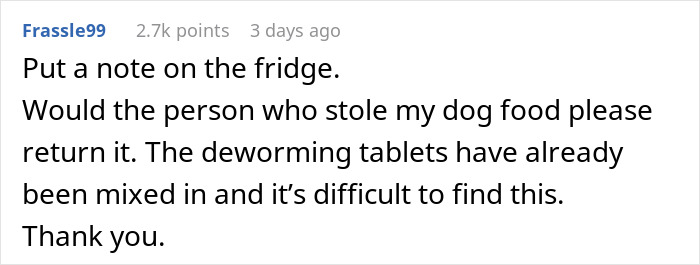
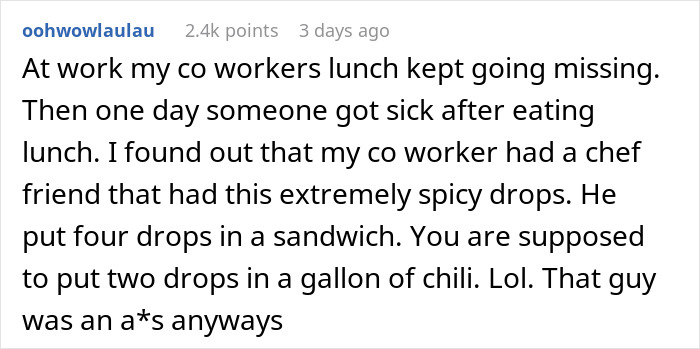
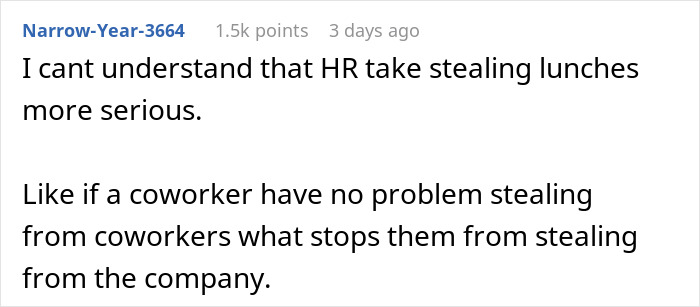


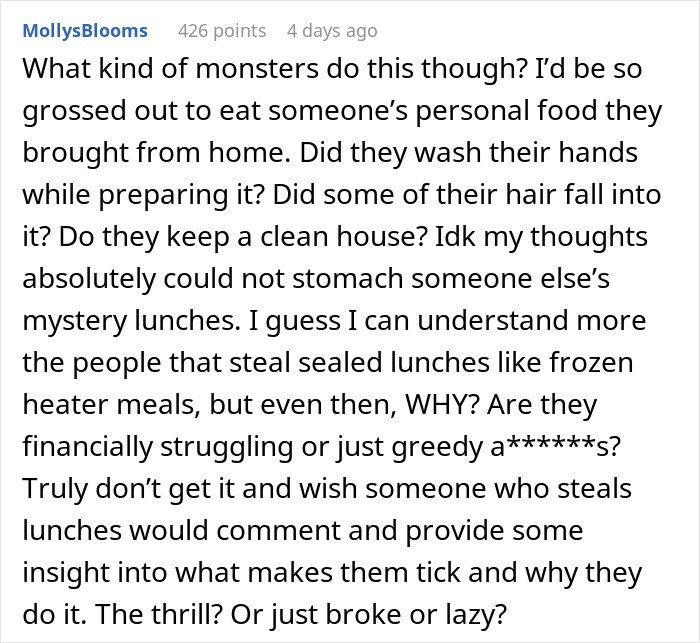



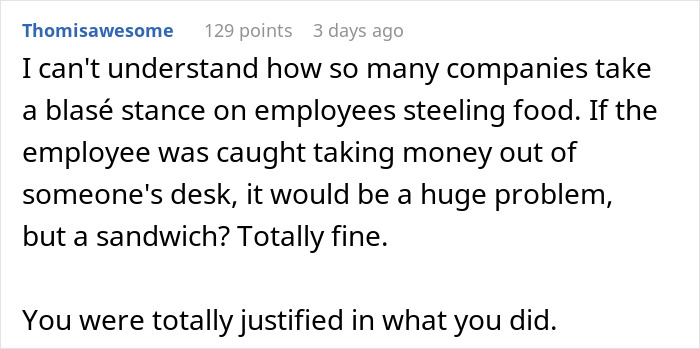
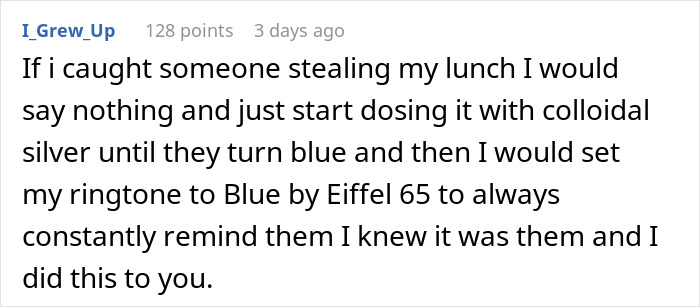

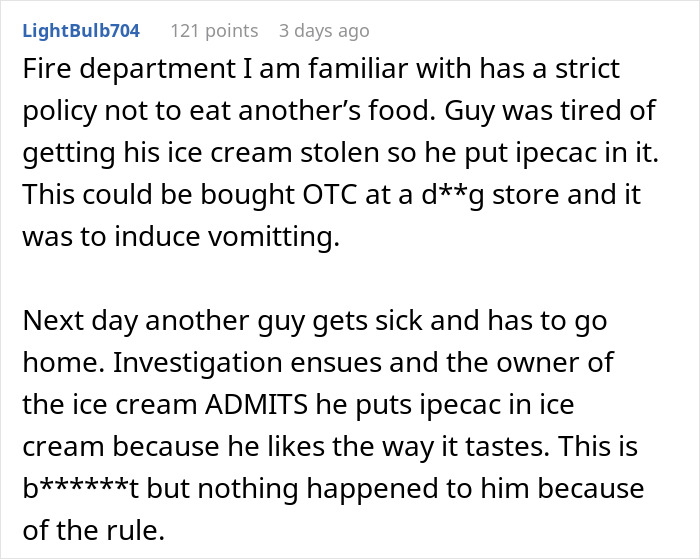

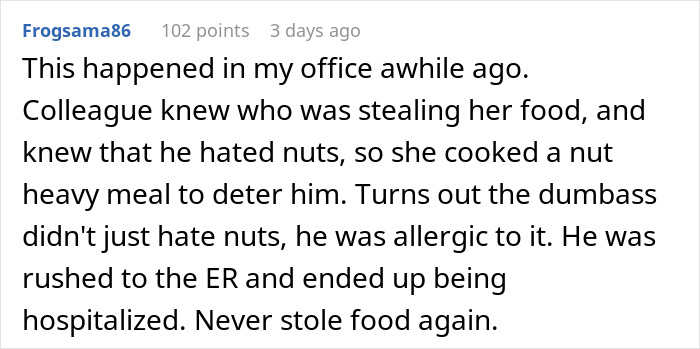



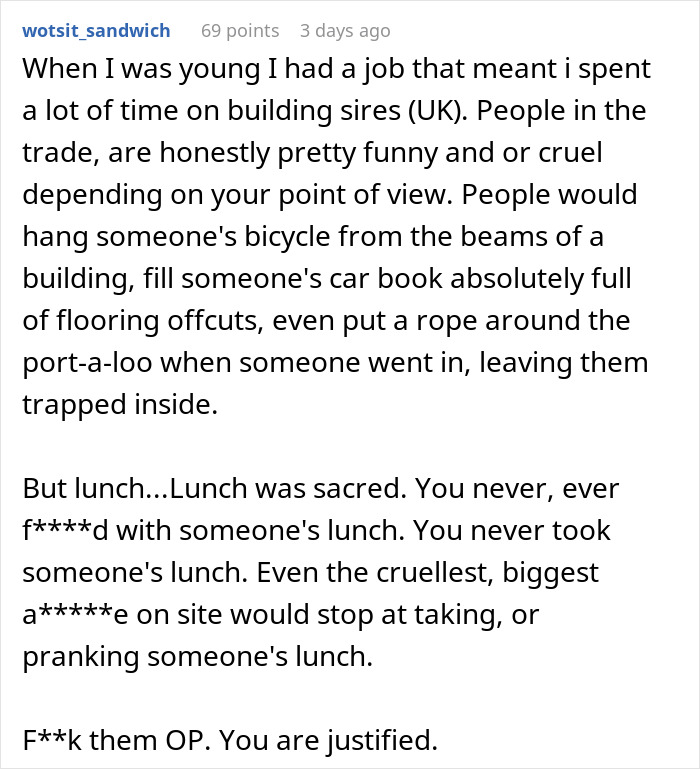

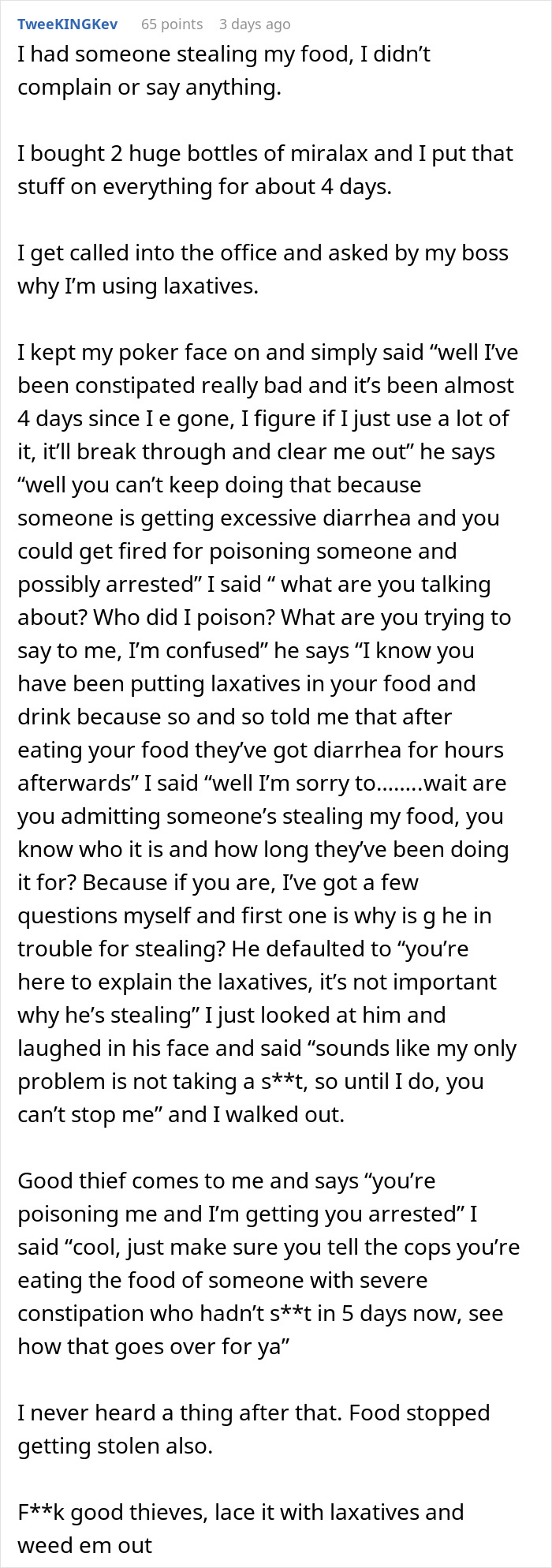



No comments